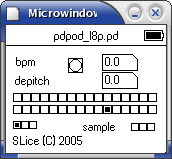 Our mention of mobile-ready Windows UMPCs has triggered a Goldilocks-style discussion of just how tiny is tiny enough — and what musical functionality people want from mobile devices. Needless to say, for most people this leads back to the laptop. For about 15 years, the laptop has unceremoniously eclipsed other form factors for mobile computing; it doesn’t need hype. But nonetheless, it’s interesting to see what’s possible — like running Pd (aka Pure Data, the open source cousin of Max/MSP) on an iPod.
Our mention of mobile-ready Windows UMPCs has triggered a Goldilocks-style discussion of just how tiny is tiny enough — and what musical functionality people want from mobile devices. Needless to say, for most people this leads back to the laptop. For about 15 years, the laptop has unceremoniously eclipsed other form factors for mobile computing; it doesn’t need hype. But nonetheless, it’s interesting to see what’s possible — like running Pd (aka Pure Data, the open source cousin of Max/MSP) on an iPod.
PdPod Wiki Page
Via a discussion on the Cycling ’74 Forum
Actually, even for Max users, porting simple patches to Pd may be the best bet. This isn’t limited to iPod, either; PdPDA is a Linux-based, PDA-ready version of Pd. So you could run this on any number of Linux mobile devices. That could be useful for simple MIDI gadgets you can tote with you. Anyone doing stuff with this, we’d love to hear from you.
It sounds like there are possibilities that go beyond the “because it’s there” rationality, to custom mobile patchers running on pocketable devices for, say, triggering MIDI sequences, etc. Well, and because it’s there.
Further down the road, it’s also not inconceivable that a clever software developer might take this idea and run, providing Linux-powered devices that run alongside their software on a PC/Mac. Think of smarter keyboards and control surfaces running embedded software, remote controls, and the like. Further-out possibilities spring to mind, too. Game developers like Nintendo have done mobile-to-console connections, where you can continue to level up a character built on your console while you’re on the bus. Imagine fine-tuning Reaktor sequencers on a mobile phone.
Video demo (thanks, Donald and Crave!):